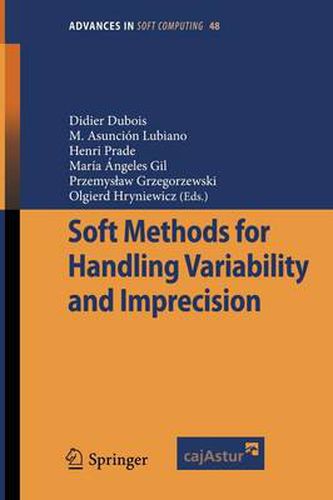Readings Newsletter
Become a Readings Member to make your shopping experience even easier.
Sign in or sign up for free!
You’re not far away from qualifying for FREE standard shipping within Australia
You’ve qualified for FREE standard shipping within Australia
The cart is loading…






This title is printed to order. This book may have been self-published. If so, we cannot guarantee the quality of the content. In the main most books will have gone through the editing process however some may not. We therefore suggest that you be aware of this before ordering this book. If in doubt check either the author or publisher’s details as we are unable to accept any returns unless they are faulty. Please contact us if you have any questions.
Probability theory has been the only well-founded theory of uncertainty for a long time. It was viewed either as a powerful tool for modelling random phenomena, or as a rational approach to the notion of degree of belief. During the last thirty years, in areas centered around decision theory, artificial intelligence and information processing, numerous approaches extending or orthogonal to the existing theory of probability and mathematical statistics have come to the front. The common feature of those attempts is to allow for softer or wider frameworks for taking into account the incompleteness or imprecision of information. Many of these approaches come down to blending interval or fuzzy interval analysis with probabilistic methods.
This book gathers contributions to the 4th International Conference on Soft methods in Probability and Statistics. Its aim is to present recent results illustrating such new trends that enlarge the statistical and uncertainty modeling traditions, towards the handling of incomplete or subjective information. It covers a broad scope ranging from philosophical and mathematical underpinnings of new uncertainty theories, with a stress on their impact in the area of statistics and data analysis, to numerical methods and applications to environmental risk analysis and mechanical engineering. A unique feature of this collection is to establish a dialogue between fuzzy random variables and imprecise probability theories.
$9.00 standard shipping within Australia
FREE standard shipping within Australia for orders over $100.00
Express & International shipping calculated at checkout
This title is printed to order. This book may have been self-published. If so, we cannot guarantee the quality of the content. In the main most books will have gone through the editing process however some may not. We therefore suggest that you be aware of this before ordering this book. If in doubt check either the author or publisher’s details as we are unable to accept any returns unless they are faulty. Please contact us if you have any questions.
Probability theory has been the only well-founded theory of uncertainty for a long time. It was viewed either as a powerful tool for modelling random phenomena, or as a rational approach to the notion of degree of belief. During the last thirty years, in areas centered around decision theory, artificial intelligence and information processing, numerous approaches extending or orthogonal to the existing theory of probability and mathematical statistics have come to the front. The common feature of those attempts is to allow for softer or wider frameworks for taking into account the incompleteness or imprecision of information. Many of these approaches come down to blending interval or fuzzy interval analysis with probabilistic methods.
This book gathers contributions to the 4th International Conference on Soft methods in Probability and Statistics. Its aim is to present recent results illustrating such new trends that enlarge the statistical and uncertainty modeling traditions, towards the handling of incomplete or subjective information. It covers a broad scope ranging from philosophical and mathematical underpinnings of new uncertainty theories, with a stress on their impact in the area of statistics and data analysis, to numerical methods and applications to environmental risk analysis and mechanical engineering. A unique feature of this collection is to establish a dialogue between fuzzy random variables and imprecise probability theories.